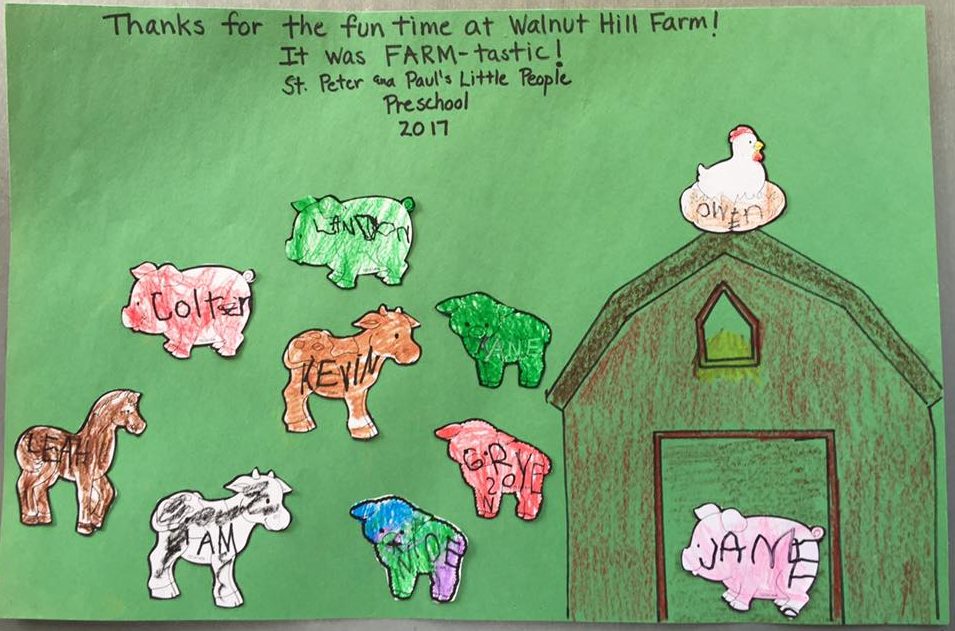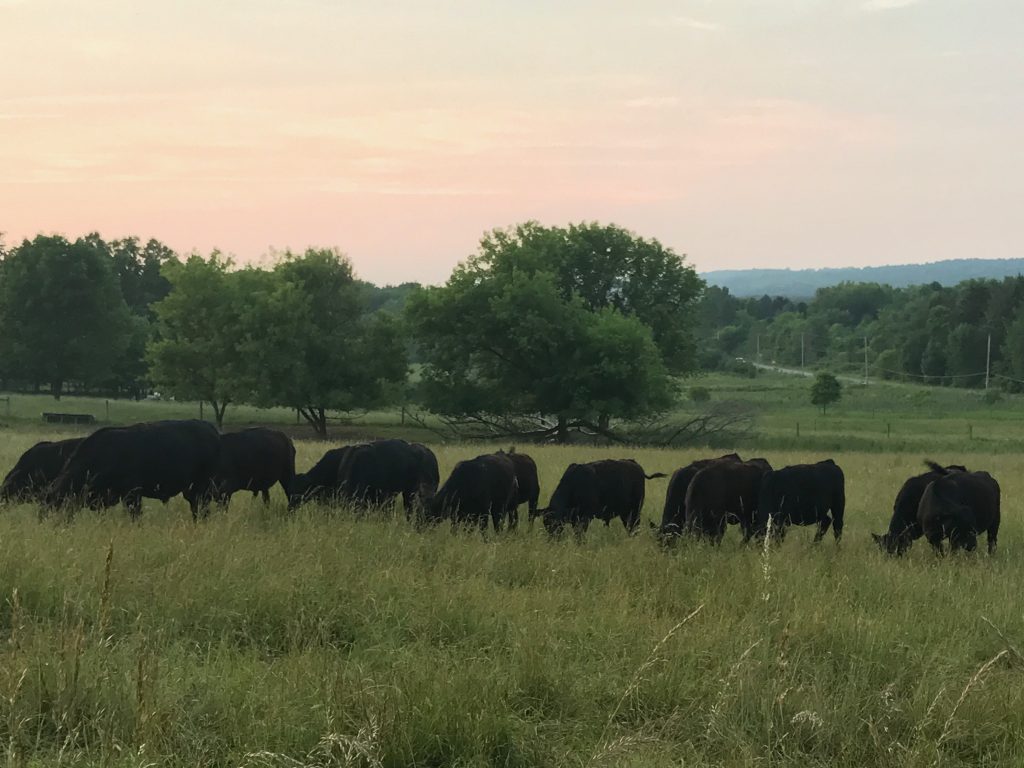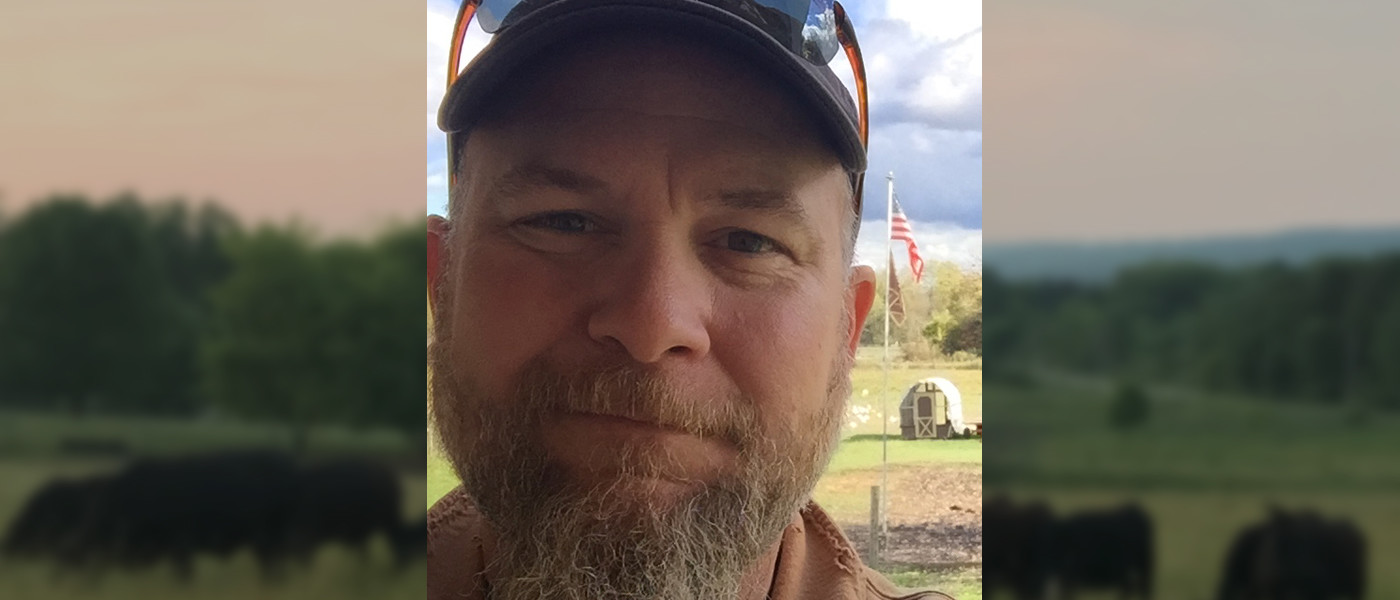Walnut Hill Farm, in Sharpsville, PA, is the product of Michael Kovach’s lifelong yearning to own a farm. Originally a geologist, he spent years drilling gas wells in western Pennsylvania, positive that natural gas was the power source of the future. “It was a great energy alternative to bridge us to the next generation, whether it be hydrogen, solar, wind or whatever,” he says. “It was so much less environmentally impactful than coal.” He loved the work, but before long the shale boom drove the ‘little guys’ out of the natural gas sector completely.
But the timing for a career change was good for Michael. His daughter Amelia had been born a year earlier, and he had begun to regret working long days away from home. Michael started farming, raising pasture grazed poultry, beef, pork and lamb. He quickly found parallels between caring for livestock and gas wells, and once he got started, he never looked back. This October, Walnut Hill Farm will start its tenth year.

Michael with his wife Karen and their daughter Amelia
The Kovachs develop close relationships with their customers at their farm stand, which is only open one day each week. The Kovachs don’t deliver to their customers, so foot traffic is heavy, giving it the feel of a busy country store. “There have been so many cool conversations over the counter at the farm stand. Friends running into friends, and people meeting for the first time.” The farm stand has become a fixture in their local community. Michael says, “It was, unexpectedly, the part that we love the most!”
It’s a boon to have a hub of dedicated supporters nearby: people who are passionate about family farms and pasture raised meat. The Kovachs know how hard it can be cultivate those direct relationships; they’ve spent years on it. “Our label is our face time,” Michael explains. Having their valued customers gathered around them at the stand builds a sense of camaraderie, and highlights how buying locally can help a community. The Walnut Hill Farm Stand is not alone in the region. According to the USDA, Pennsylvania ranks fourth in the country for direct farm sales.

Pennsylvania is also widely known to be the birthplace of organic agriculture, and locals are eager to buy from trusted growers. Michael had always been interested in sustainability, but he didn’t expect to be part of the organic movement. Instead, he got his start in organic production by trying to save money by not buying expensive chemical fertilizers to put into his soil, or preventative antibiotics in his animals. As he got more interested in “not buying extra things,” he started reading more about permaculture, rotational grazing and organic farming. He realized that a lot of those symbiotic methods made good sense, and not just financially. It became second nature to use pigs to clear pasture or to clean up fallen fruit. He laughs now to think about how he used to mow pastures rather than have his cows graze them down. As his interest and pride in organic methods grew, he joined Pennsylvania Association for Sustainable Agriculture (PASA). He went to a few conferences before he “fell in with a bad crowd,” as he jokes, and joined another organization.
Hannah Smith-Brubaker, the current executive director of PASA, has worn many hats in the agricultural community. Formerly the Pennsylvania Deputy Secretary of Agriculture, Hannah was the president of the Pennsylvania Farmers Union (PFU) when she introduced herself to Michael. She knew he’d be an asset to the organization, and was hoping to persuade him to join their board of directors. He was stubbornly reluctant. “I didn’t really know much about Farmers Union at the time, and to be honest there were a couple of issues that they advocated for back then that kind of stuck in my craw.” After a lot of back and forth, Hannah won him over. “She sold me on it. And once I got involved, I really discovered the value in a big tent approach to advocating for family farmers,” he says. “Farmers Union has been terrific as far as broadening my perspective on how can we can we all get this done together better.”
“The time has never been better to be a farmer. There’s a voice for you now – much more so than in the past.”
What does that mean exactly? Pennsylvania Farmers Union is all about family farms. Their core principles, “educate, cooperate, legislate,” undergird the methods they use to help family farmers from all over the state. Through grassroots networking and an emphasis on policy, the Union advocates for family farmers on state and national levels, in partnership with their umbrella organization, National Farmers Union (NFU) — a Farm Aid grantee. In Michael’s experience, they are incredibly valuable to family farmers of all kinds. “The time has never been better to be a farmer,” Michael says. “There’s a voice for you now – much more so than in the past.”

Michael’s work with PFU (and, for the record, since he farms on both sides of the Pennsylvania/Ohio border, Michael’s also an Ohio Farmers Union member!) began with a single National Farmers Union fly-in to Washington, D.C., in 2015. Each September, more than 250 farmers from all over the country descend on Capitol Hill to visit every member of Congress and advocate for better farm policies. It was eye opening for Michael to work together with Farmers Union representatives from what he calls “the whole spectrum of farming,” and he has maintained relationships with farmers from other states that he might not have met otherwise. Together, they lobby their elected officials to vote for policies that help American family farmers thrive.
“There’s much less of a divide now, at least in my mind, between large, row crop, commodity type farmers and sustainable farmers than there was when I started,” Michael states. “It seems like everybody’s more at the table than I ever recall being the case.” And that isn’t an accident. Though they have an eye towards sustainability, NFU supports all types of family farmers, no matter their methods. In contrast to the widening chasm in American politics, farmers have something to unite over and Farmers Unions all over the country are working on a common cause.
The impending farm crisis is having an effect on family farmers of all stripes. Struggling against falling prices has united farmers in search of new methods, and Michael sees a shift happening among his farmer friends. Many are moving towards sustainability. That might mean anything from going grass-fed, to diversifying crops, or opting for non-GMO crops. “If there’s any silver lining to this farm crisis, it’s [the surge in] ‘alternative’ types of farming, which basically is the same type of farming that used to happen one hundred years ago, but with better equipment. And solar fences!”
Michael hopes that other farmers will realize that there’s a growing market for more sustainably grown products. By last April, the USDA estimated the retail market for organic products at more than $39 billion, and growing. As Michael says, there are many reasons to start seriously considering sustainability, but, he says, “If it takes looking at it from a business perspective, then okay. That’s fine, because sustainability is going to sell itself to you after a season or two.”
A gregarious man with a wickedly sardonic sense of humor, you might not guess that he’s ultimately an optimist. He thinks the future is bright for family farmers, organic or not. In talking about his ambitions for his own farm, Michael hopes to see constant improvement. Walnut Hill Farm is an evolving organism, and he has no shortage of projects and plans for it. In his typical style, he jokes, “In another thirty to forty years, we’ll have this place right where we want it.”
Connect with Walnut Hill Farm on their Facebook page



